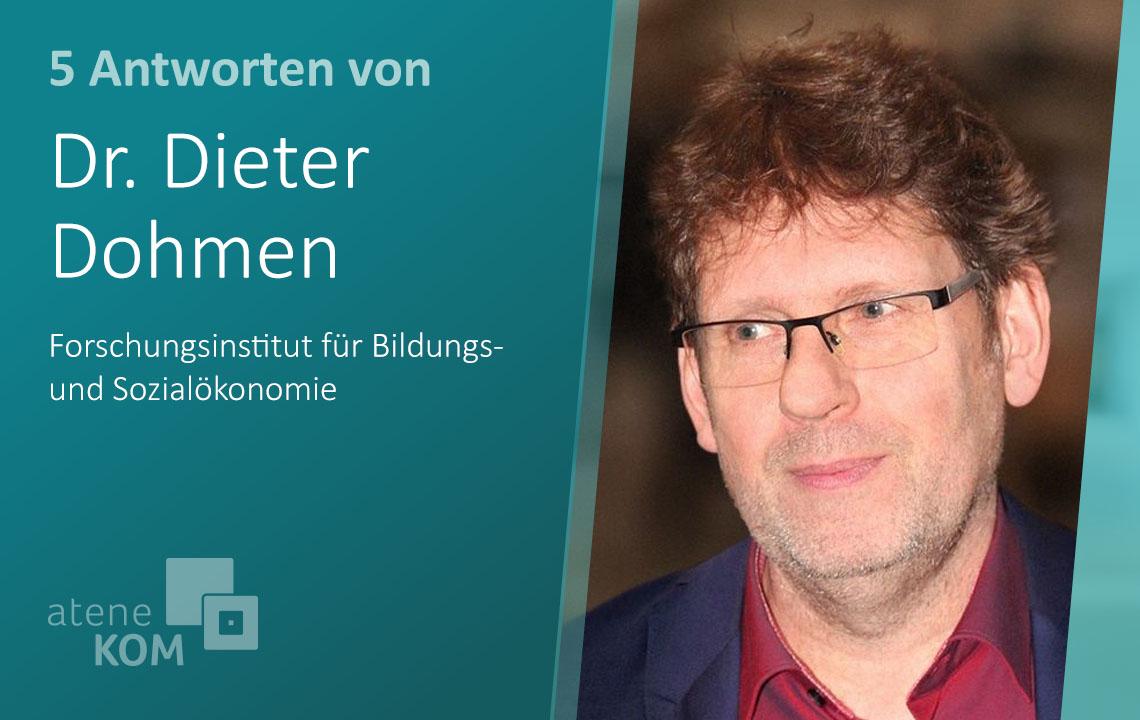The digitalization of the education sector is bringing new digital learning tools to educational institutions. Approaches such as serious games and gamification, for example, are alternative learning models designed to convey content in a playful way. Dr. Dieter Dohmen, founder and director of the Research Institute for the Economics of Education and Social Sciences (FiBS), is convinced that these and similar digital learning tools enable more individualized learning. In an interview with aconium GmbH, he explained how digital learning methods can address different target groups more precisely in the future.
aconium: How are digital technologies already being meaningfully integrated into teaching in Germany?
Dr. Dieter Dohmen: That depends very much on the school and the teachers. Many schools have too few and often outdated computers, and the infrastructure is not good either. Other schools are doing better and digital technologies are already being used a lot, whether in individual subjects such as the GeoGebra app for math lessons or for researching information in general. It mainly depends on the teacher whether digital media have added value or not – which also applies to “normal” lessons.
aconium: What other forms can digital education take in schools in the future?
Dr. Dohmen: Schools should be enabled to use digital technologies at the technical or infrastructure level as quickly as possible. Teachers should then be given the opportunity to use digital education tools pedagogically and didactically. Whether they actually do so depends on many factors – topic, objective, didactic added value, etc. – so in my opinion there is no universal answer. However, we should generally develop an open and critical attitude towards it. Digital education is neither automatically a savior nor the devil’s plaything. It always depends on what you do with the tools – and for what purpose.
aconium: What special features need to be considered when digital learning tools are introduced in elementary school – compared to vocational schools or universities?
Dr. Dohmen: In primary school, it should be more about learning the basics, i.e. arithmetic, writing, reading, but also reflecting. Digital technologies should be used rather cautiously – for example, when they really offer added didactic value – if competencies, skills and abilities are to be acquired that cannot be taught otherwise or only with great difficulty. For example, socio-emotional skills can be learned through online games.
In addition to the “usual” online tools such as YouTube or Google, game-based learning platforms such as Kahoot are also used in vocational schools and universities. The multitude of applications used can hardly be reasonably delimited, as in my opinion everything that happens online can also be used to acquire knowledge and learn. The purpose for which I use something is more important than the tool.
aconium: How will digitalization change the field of continuing education?
Dr. Dohmen: Digitalization has already significantly changed continuing education by making learning content available online almost anytime and anywhere. In my opinion, important advantages are that a number of target groups can be addressed much better and more precisely with digital learning tools – provided that the tutors or learning developers respond to the needs of the target group. For example, I see serious games and gamification as an opportunity for lifelong learning, especially for so-called educationally disadvantaged groups – if the previous barriers to learning are skillfully addressed and overcome. However, it should be borne in mind that skills (reading, writing, arithmetic) are a core component of digital skills, and that some adults do not master them or only to a limited extent. For this group, more emphasis should be placed on other forms of communication.
Furthermore, all adults must be enabled to master the transition to the digital world and meet the associated requirements of the world of work and their profession. We are currently running the risk of the world becoming even more divided: Some employees will then be able to cope very well in the digital world, while others will have little chance of preparing for further changes. Like many other things, this has a lot to do with the level of school-leaving qualifications or training.
aconium: What would you like to see in the digital education of tomorrow?
Dr. Dohmen: On the one hand, young and older people must learn to use digital technologies independently and critically. In addition to the basic skills of reading, writing and arithmetic, this requires them to know how to use digital media to their advantage. This includes, for example, the ability to formulate good search queries, deal with security issues and assess what they can and cannot disclose online.
You can read more about digital education in the dossiers on digitalization from aconium GmbH:

